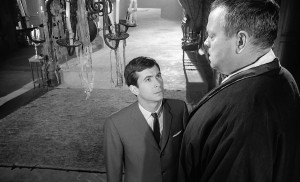 Review: One Night Only
Review: One Night Only
The Trial | Orson Welles | France, West Germany, Italy | 1962 | 118 min
UW Cinematheque, 4070 Vilas Hall, Friday, September 11, 7:00pm»
Well done, Orson Welles, well done. You really surprised me. I have seen Citizen Kane and The Third Man many times. I had to because they are classics and the stories are so well constructed and the cinematography is unbelievable. Yet I always walked away thinking they were missing something unique, some oomph. But, man, The Trial was nothing but unique. This is the Orson Welles I like to see.
The film that Welles declared his favorite starts with the “Before the Law” parable from the Franz Kafka novel that inspired it: a parable that suggests the following is a dream, or at least has the logic of a dream. After the parable, we are thrown into Josef K’s (Anthony Perkins) room right at the moment that two inquisitive men barge in the door. This is the beginning of the mysterious investigation that is never explained but continues for the entirety of the film. Josef is accused of a crime that is unknown to him, and to us.
Josef K is infatuated with his neighbor, Ms. Burstner (played by the lovely Jeanne Moreau), who is eventually kicked out of the rental house because of her scandalous occupation. After her departure, Josef declares he will find her but that is quickly forgotten and she is gone for the rest of the film. He then hops from work, to courtrooms, to public buildings where naked old men are scattered and finally back home. The settings change so fast; a door will lead to somewhere unexpected and illogical. Eventually he is introduced to his lawyer, Albert Hastler (Orson Welles), whose assistant is a sex-crazed, good-looking lady (Romy Schneider) who sleeps with all of Hastler’s clients. These are all bits of a puzzle that I never solved. But Josef never puts the pieces together either, except to understand that his case is not going well.
The entire film is littered with evidence of a dream. Beautiful women throw themselves at Perkins, situations and people come and go without explanation or exposition. Family members show up in unexpected places. Perkins somehow knows how to act appropriately in every situation even though he insists he does not know what is going on. Whenever he meets a new person things get intimate real fast. And the amount of time passing is never clear.
The sheer confusion of what the hell is going on drove the momentum for about half the film. Then, I gave up and decided to enjoy the mysterious ride and let Anthony Perkins’ dramatic and nervous acting keep me engaged for the rest of the film. Oh, and the cinematography is unbelievable. Of course. The gigantic luring shadows, the sharp contrast between light and dark and the extreme canted angles. Faces are shown really close up and in a wide angle, most notably with Josef’s mute co-workers, all adding to the distorted and uneasy plot.
I can’t believe this film was released in 1962.The Trial had to have been an inspiration for Eraserhead in cinematography, sound design and decor; for Mulholland Drive in its dream logic narrative; and for Brazil in its conspiracy riddled-plot. I like these films because they are different and unexpected and that is why The Trial remains an awesome viewing experience in 2015.